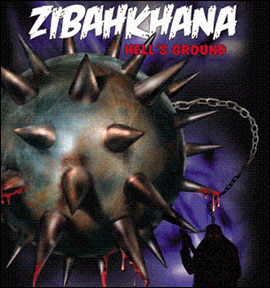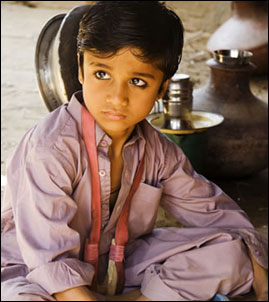|
|
| |
Pakistani
films create
waves in an Indian 'Osian'
Pakistan's prominent presence at the 10th Osian's Cinefan Film
Festival in Delhi is highly encouraging - with films by Pakistan's
upcoming directors being screened and awarded at the festival, there
was much to look forward to at this exciting event celebrating cinema
in the region!
By
Aijaz Gul |
| |
The
Osian film festival was held in Delhi from July 10 - 20, 2008, and
was opened by Sheila Dikshait, Chief Minister of the Capital Territory
of Delhi. The festival largely covered the best of Asian and Arab
films, and featured several other categories and tributes.
As a Pakistani, Pakistan's prominent presence was highly encouraging
to see. There have been several times in the past when there was absolutely
no participation from Pakistan at all. But this year's Osian's Cinefan
Film Festival truly compensated for the past nine years, with the
fantastic array of Pakistani movies being screened!
On the ticket: Pakistani directors make a splash!
Pakistani directors were one of the key highlights at the festival.
Present at Osian were Mehreen |
 |
Jabbar
and Javed Jabbar to show 'Ramchand Pakistani', Ehteshamuddin to screen
his film 'Yeh Hindustan Woh Pakistan', Saife Hasan with 'Victoria
Ka Ticket', Omar Ali Khan with 'Zibahkhana' and Sharjil Baloch brought
his film 'Grumkh Singh Ki Vasiyat'.
With
Lahore's Lakshmi Chowk bent upon bringing out the worst in us in the
shape of assault rifles, blood baths and body bags, it was comforting
to see 'Ramchand Pakistani' and a lot more at this prestigious Indian
film festival. Better still, all of the Pakistani films screened were
highly appreciated. A special session with a press conference was
held during the festival, which left one reaffirmed about the goodwill
Pakistanis and Indians have for each other. The session began in English
and ended with Urdu, a language which unites us.
Mehreen Jabbar's 'Ramchand Pakistani' was screened more than once
to accommodate crowds, and there was pin-drop silence for all 105
minutes of the film. After the screening, producer Javed Jabbar remarked
that this film was the story of the people, and there should not be
any bitterness amongst people.
|
| |
'Ramchand
Pakistani' is about a family which has been torn apart through no
mistake of their own. Mehreen Jabbar, whose creative abilities and
cinematic talent are abundantly visible in every shot of the film,
said "What you see is what I made with minor cuts." Javed
Jabbar also pointed out that the film could not have been completed
without the cooperation of Pakistani and Indian governments. The crew
visited a jail in Indian Gujarat and came out within six hours after
lensing. According to Javed Jabbar, this was a remarkable example
of creative cooperation between the two countries.
Ehteshamuddin's
'Yeh Hindustan Woh Pakistan' was part of his series of films based
on stories about the India-Pakistan partition in 1947. It deals with
two villages on either side of the border, where a Hindu woman is
forced to live with a Muslim family.
|
 |
| Sharjil's
'Gurmukh Singh Ki Vasiyat' also revived the tragedy of 1947. On the
other hand, Saife Hasan's 'Victoria Ka Ticket' showcased childhood
memories.
|
| |
Omar
Ali Khan's 'Zibahkhana', a well-made horror film released last year,
was another popular title at the festival. While talking to the press,
Omar pointed out that there was no tradition of horror films in Pakistan.
Only a few films such as 'Zinda Laash' and 'Deewana' had come out
of the Pakistani film industry in the last sixty-two years, yet Omar
was very passionate about making a horror film in Pakistan. Omar pointed
out that not only did 'Zibahkhana' undergo through numerous problems
with censors, it was already available in the market on DVD and video
prints due to rampant piracy in Pakistan.
Reviving
Pakistani Cinema: What our filmmakers think:
Eshteshamuddin, who has been invited by several film festivals in
the last two years to show his prestigious film 'Shahrukh Khan Ki
Maut', said that a regular exchange of films between Pakistan and
India was necessary and the use of Indian talent in Pakistani films
and vice versa was beyond mutual benefits. Ehteshamuddin, Saife Hasan
and Sharjil Baloch pointed out that in order to improve Pakistani
cinema, regularly exchanging films with India is essential.
|
| |
Omar
Ali Khan pointed out that the screening of Indian films in Pakistan
on video and cable TV has completely changed the demography of films
in Pakistan. The decline in the standards of cinemas is partly the
major reason why people in Pakistan do longer go the cinemas and this
is a case in point with Urdu films. This has not had the same affect
on Pushto and Punjabi films. These films have an ample dose of violence
and sex, and their audiences have no access to watch videos and DVDs
at home.
|
 |
| |
|
As
for filmmakers making films for TV, they have bright prospects to
recover their initial cost of around five lakh from private television
networks. The only drawback here seems to be the constant interruption
of advertisement breaks (just like the constant interruption of
six songs in our feature films). Additionally, the Karafilm festival
has motivated many young filmmakers to make short films and documentaries.
Osian
Events: A film enthusiast's dream
Osian also held an auction house where apart from paintings, sketches
and rare books, film posters of Mirza Ghalib, Sangam and Koh-e-Noor
sold at fantastic prices. Cinema art lovers snapped up art featuring
Dilip Kumar, Meena Kumari, Raj Kapoor, Vijvanti Mala, Bharat Bhoshan
etc.
Another highlight at the festival was a special session on Arab
films, which featured directors from Morocco and Palestine talking
about the current issues being undertaken by the filmmakers in difficult
situations. A screenplay seminar by the noted Hollywood screenwriter
Paul Schrader was also held, whose film 'Taxi Driver' ran to a packed
house during the festival.
The 10th Osian Cinefan Film festival was a remarkable event for
film enthusiasts. The passion, dedication and hard work of Osian's
founder-chairman Neville Tuli and his joint directors Latika Padgaonkar
and Indu Shrikent was evident throughout the festival - and this
celebration of films from Asia and the Middle East was a great experience
to be a part of! Here's to hoping more Pakistani films make their
mark at this festival in the years to come. |
|
|

